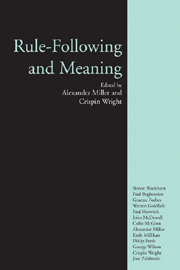Book contents
- Frontmatter
- Contents
- Acknowledgements
- The Contributors
- 1 Introduction
- 2 Skepticism and Semantic Knowledge
- 3 The Individual Strikes Back
- 4 Wittgenstein on Following a Rule
- 5 Wittgenstein, Kripke and Non-Reductionism about Meaning
- 6 Kripke on Wittgenstein on Rules
- 7 Critical Notice of Colin McGinn's Wittgenstein on Meaning
- 8 Meaning and Intention as Judgement Dependent
- 9 The Rule-Following Considerations
- 10 The Reality of Rule-Following
- 11 Truth Rules, Hoverflies, and the Kripke–Wittgenstein Paradox
- 12 Kripke on Wittgenstein on Normativity
- 13 Meaning, Use and Truth
- 14 Kripke's Normativity Argument
- Guide to Further Reading
- Index
2 - Skepticism and Semantic Knowledge
- Frontmatter
- Contents
- Acknowledgements
- The Contributors
- 1 Introduction
- 2 Skepticism and Semantic Knowledge
- 3 The Individual Strikes Back
- 4 Wittgenstein on Following a Rule
- 5 Wittgenstein, Kripke and Non-Reductionism about Meaning
- 6 Kripke on Wittgenstein on Rules
- 7 Critical Notice of Colin McGinn's Wittgenstein on Meaning
- 8 Meaning and Intention as Judgement Dependent
- 9 The Rule-Following Considerations
- 10 The Reality of Rule-Following
- 11 Truth Rules, Hoverflies, and the Kripke–Wittgenstein Paradox
- 12 Kripke on Wittgenstein on Normativity
- 13 Meaning, Use and Truth
- 14 Kripke's Normativity Argument
- Guide to Further Reading
- Index
Summary
This paper is about the ‘skeptical paradox’ which Saul Kripke extracts from the one hundred or so sections of Wittgenstein's Philosophical Investigations preceding §243, and focuses on the dispositionalist response to the skeptic, which seems to me to be a better response than Kripke is willing to allow.
The paradox is: ‘… no course of action could be determined by a rule, because every course of action can be made to accord with the rule’ (Investigations §210). When someone masters a concept, we think of him as grasping a content or meaning which will guide his future applications of the concept and against which those applications will be assessed as correct or incorrect. The challenge the skeptic poses is that of specifying a fact about the subject in virtue of which his later applications are correct, or incorrect. Perhaps, for example, the subject's understanding has degenerated over time, so that the applications he now makes he would once have rejected. The problem is not an epistemological one: the point is not that the subject cannot be sure that his understanding of the concept has not changed, but rather that there may be no such distinction as the purported one between a situation in which his understanding stays the same and one in which it changes. Thus, the skeptic's questions are not about how the subject knows that his understanding is the same as it was previously, for he holds that there is nothing to know here; instead, they are about what makes it the case that it is the same as it was.
- Type
- Chapter
- Information
- Rule-Following and Meaning , pp. 16 - 27Publisher: Acumen PublishingPrint publication year: 2002
- 1
- Cited by



